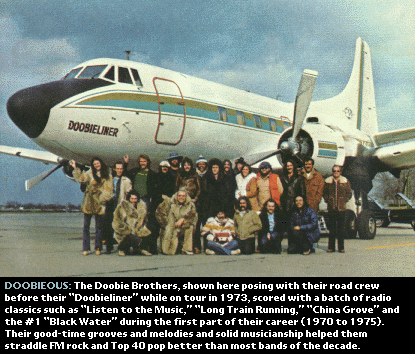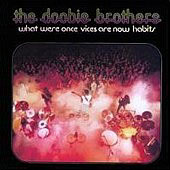|
"Black Water" The Doobie Brothers Warner Brothers 8062 Mar. 1975 Billboard: #1
"Black Water" was not so highly regarded when the album What Were Once Vices Are Now Habits was released. It was relegated to the flip side of the LP's first single, "Another Park, Another Sunday." "We never thought it was a single," Templeman confirms. "I didn't even know it. I'd like to tell you I did. Some little station started playing it in the South, and it started getting played around the country... it was just a self-made hit, a radio-made record."
The Doobie Brothers decided to produce their own second album and spent a lot of money to get mediocre results. Warner Brothers was tempted to drop them from the label, but Templeman still believed in the band and volunteered to produce their second LP, Toulouse Street. That album contained the first hit single for the Doobies, "Listen to the Music" (number 11 in November, 1972). The group's third album, The Captain and Me, was considered the group's real commercial breakthrough. "Long Train Runnin'" became the Doobies' first Top 10 single (number eight in June, 1973). Templeman offers an analysis of why "Black Water" was the Doobies' biggest hit. "Nobody was doing that kind of record with a vocal a cappella. It started off as an acoustic song, just an acoustic guitar for the first third of the record, then the drums come in. Records weren't like that on the radio. There were formula pop records then." Templeman doesn't consider the record perfect. "There's little things that speed up and slow down because we didn't stay right with the rhythm machine. But it's a pretty good record." When Tom Johnston developed a stomach ailment the following year and quit touring with the band, it looked as though the Doobie Brothers' best years were behind them. However his replacement, Steely Dan alumnus Michael McDonald, would lead the Doobies to even greater commercial and critical heights before the decade was over with another number one hit single, "What a Fool Believes," and the multimillion-selling album from which it was taken, Minute by Minute. In 1987, the pre-McDonald lineup reformed and returned to the band's original sound with the gold album Cycles and the Top 10 single "The Doctor." After the less successful release Brotherhood in 1991, the group claimed to have called it a day. But several of the original members undertook another major summer tour three years later, and the band is still active in touring and recording. - Fred Bronson, The Billboard Book of Number One Hits, Billboard, 1988.
No comments so far, be the first to comment. |


